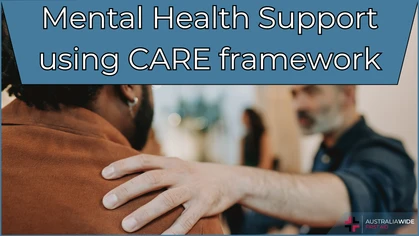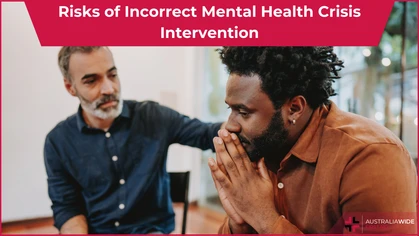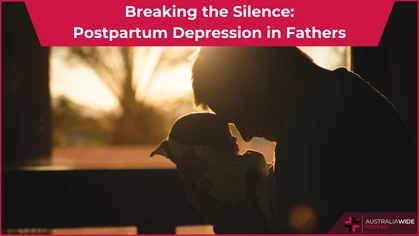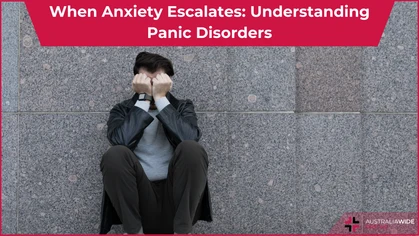Ways to Improve Resilience

Mental Health
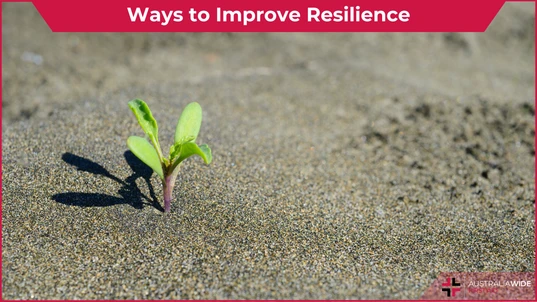 Many definitions of resilience exist, but one of our favourites is: Resilience is the power or ability to return to the original form, position, etc. after being bent, compressed, or stretched. Simply put, it is the ability to recover readily from illness, depression, adversity, or the like.
Resilience is often referred to as ‘hardiness’: a way of developing good outcomes by adapting and learning from obstacles and challenges. Resilient people tend to accomplish this faster, often with less time spent floundering in emotion.
We experience ‘activating events’ every day in life and at work. HOW we are able to process events, manage our emotions and self-talk goes a long way to maintaining resilience.
A recent overview by leading resilience researchers highlight that for an environment to facilitate resilience, it needs to be both high in challenge and support. Too much challenge and no support results in excessive stress, burnout and isolation. Too much support but not enough challenge can lead to complacency and boredom.
Many definitions of resilience exist, but one of our favourites is: Resilience is the power or ability to return to the original form, position, etc. after being bent, compressed, or stretched. Simply put, it is the ability to recover readily from illness, depression, adversity, or the like.
Resilience is often referred to as ‘hardiness’: a way of developing good outcomes by adapting and learning from obstacles and challenges. Resilient people tend to accomplish this faster, often with less time spent floundering in emotion.
We experience ‘activating events’ every day in life and at work. HOW we are able to process events, manage our emotions and self-talk goes a long way to maintaining resilience.
A recent overview by leading resilience researchers highlight that for an environment to facilitate resilience, it needs to be both high in challenge and support. Too much challenge and no support results in excessive stress, burnout and isolation. Too much support but not enough challenge can lead to complacency and boredom.
Focus on what you can control
We often experience a sense of helplessness or hopelessness when undergoing stress. This can lead to an experience of feeling out of control. When we can keep our eye on the big picture, as well as the smaller details, we can maintain a sense of perspective. Perspective can help us to understand what we can control, and actively make sensible decisions to influence outcomes.Surround yourself with people who build you up
It has been well documented that we experience a tendency towards isolation when we experience stress. The impact of connection on resilience has been well documented. As well as impacting mood, connecting with others who build us up can impact motivation. By proactively choosing who we spend time with, we can consciously create a supportive environment that contributes to our development.Believe in your ability to overcome hardships
Researcher Angela Duckworth states that having a sense of hope and optimism is a key component to developing resilience and grit. This is often referred to as a ‘challenge state,’ or a state of mind where we believe we have the abilities to meet the demands of the situation and thrive. We actually have the ability to choose whether we adopt a ‘challenge state,’ or a ‘threat state’ of mind.Be mindful in experiencing stress - what have you learnt?
There is a popular internet quote that reads, “life begins at the end of your comfort zone.” While very motivating, this quote unlocks some truths about resilience. Stepping out of our comfort zone gives us the experience of stress and this is necessary for our growth and development as individuals. It is important that we remain mindful during stress and are able to reflect on the experience. Try focusing on asking ‘what have I learnt?’ instead of the discomfort.Be flexible and adaptable
When we experience stress, we often react with our amygdala (brain stem) rather than respond with our pre-frontal cortex. Author Jodi Picoult wrote in My Sister’s Keeper that “the human capacity for burden is like a bamboo – far more flexible than you’d ever believe at first glance”. Being flexible is a key component of resilience. Adopting an adaptable mindset will help you to better respond to change, be more creative in your problem solving and bounce back quicker after the experience of stress.Develop a self-care plan
Despite the high levels of stress experienced by veterinary professionals every day, very few veterinary professionals have consciously developed a self-care plan. Self-care has been strongly linked to resilience and our ability to rebound after experiencing stress. Invest time in developing a self-care plan and then implement each practice into your life and regularly review and update your self-care plan. This article has been republished with permission, originally published by Crampton Consulting Group.
Originally published at
https://www.australiawidefirstaid.com.au/resources/ways-to-improve-resilience
as part of the Australia Wide First Aid Articles Library

